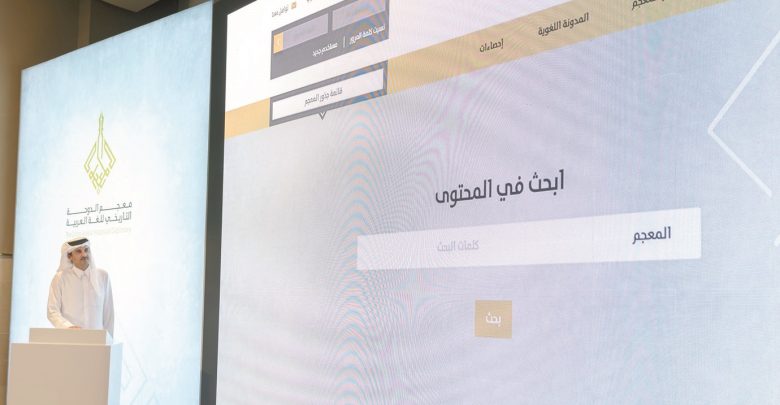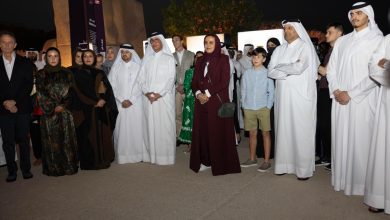
Doha Historical Dictionary a milestone
معجم الدوحة التاريخي علامة فارقة ترصد تطور لغتنا
QNA
Doha: Arabic language experts stressed that Qatar’s adoption of the Doha Historical Dictionary of Arabic provides a great service for the advancement of science in the language of the nation.
A number of those who worked on the dictionary stressed yesterday that completing project, which was first launched yesterday, is worthy of an unprecedented linguistic renaissance. With the dictionary, the Arabic language and its texts will be compiled into an electronic language code that will be the largest ever.
General Director of the Arab Center for Research and Policy Studies Dr Azmi Bishara, who is also director-general of the project, said in a speech marking the launch that the dictionary would never have been completed if it weren’t for the faith in joint Arab work, solid management, and the Arab experts who worked on it. He highlighted that other similar projects that took place in the past had to end before reaching its desired goal.
Bishara did also discuss the successes of the past, beginning with the establishment of the Arabic language complex in Egypt in 1932 and elsewhere in the Arab world, all of which were certainly remarkable efforts but have not yet reached the milestone of establishing a historical dictionary of the Arabic language.
Bishara stressed that what the project achieved in five years, two of which were for establishing a methodology and creating a database, is a major and unique achievement at the Arab and even international levels. In three years, 100 thousand dictionary entries covering seven hundred years were completed until the year 200 Hijri. This was despite the special nature of the Arab language.
He discussed a number of previous experiences with historical dictionaries in other languages, which took a long time compared to this project. The Germans took centuries and two decades to finish 400 years only from the history of their language. It also took 70 years for the English language dictionary to produce its first edition. Bishara said that adding ‘Doha’ to the name of the dictionary was to reflect that it is a gift from Doha to the entire Arab world.
For his part, member of the Academic Council for the Doha Historical Dictionary of Arabic Ali Ahmed Al Kubaisi said that Doha Dictionary is a qualitative leap in serving the Arabic language. He added that the Doha dictionary was the first successful Arab attempt in this regard, noting that it would open new horizons for all researchers and scholars in all fields of Arabic language studies and prepares for a sophisticated Arabic dictionary industry. He also stressed that the support of the State of Qatar reflects the commitment of its wise leadership to enhancing the presence of the Arab language.
Executive Director of the dictionary Dr Aze-Eddine Bouchikhi said for his part that any nation exists because of the existence of a historical dictionary for its language. Bouchikhi pointed out that the historical Doha Dictionary of Arabic was unique, as it added 100 thousand dictionary entries covering seven hundred years until the year 200 Hijri. He said that the project can be constantly updated, and is open to all experts and researchers to recommend amendments.
Speaking to Qatar News Agency (QNA) on the impact the dictionary will have on the future of the Arabic language, Bouchikhi said that the dictionary provides an important repertoire of Arabic words that may have been neglected in use, forgotten by people, or do not know their implications, or even the semantic developments that have taken place.
On the existence of a media plan to introduce the Doha Historical Dictionary in the Arab world, The executive director of the dictionary confirmed that there is a plan to introduce the dictionary not only in the Arab world but also in the West. He also said that the e-portal will allow them to gauge the interaction with the dictionary as well.
Head of the Academic Council Dr Ramzi Baalbaki pointed out that the dictionary kept a balance between the knowledge left by the ancestors, and modern human knowledge which witnessed a scientific revolution in the field of linguistic sciences in general and in dictionaries in particular. He then thanked the State of Qatar and its leadership for supporting such an historic project.
Dr Mahmoud Ghanayem told QNA that the launch of the dictionary represents a new beginning for the Arabic language. He highlighted that there were previous attempts in the last century to create a historical dictionary but were not fully completed, as it needed a scientific and sound management staff. He also said that the period covered in the first phase was the most difficult to cover. Dr Abdulghani Abo Al Azm also said that the project was a leading initiative by Qatar, and called for efforts to continue to complete it.
غرد الحساب الرسمي لحضرة صاحب السمو الشيخ تميم بن حمد آل ثاني أمير البلاد المفدى، حول مشاركة سموه في حفل إطلاق معجم الدوحة التاريخي، أمس، حيث هنأ صاحب السمو القائمين على «المعجم الأول من نوعه في تاريخ العرب والعربية»، مشيراً إلى أنه «يعد علامة فارقة ترصد تطور اللغة العربية».
وجاء على حساب أمير البلاد المفدى: «شاركت اليوم في حفل إطلاق #معجم_الدوحة_التاريخي للغة العربية، وهو الأول من نوعه في تاريخ العرب والعربية، ويعد علامة فارقة، حيث يرصد تاريخ تطور ألفاظ لغتنا العربية. أبارك للقائمين عليه ولأبناء العربية جميعاً هذا المنجز النهضوي المهم والكبير».



